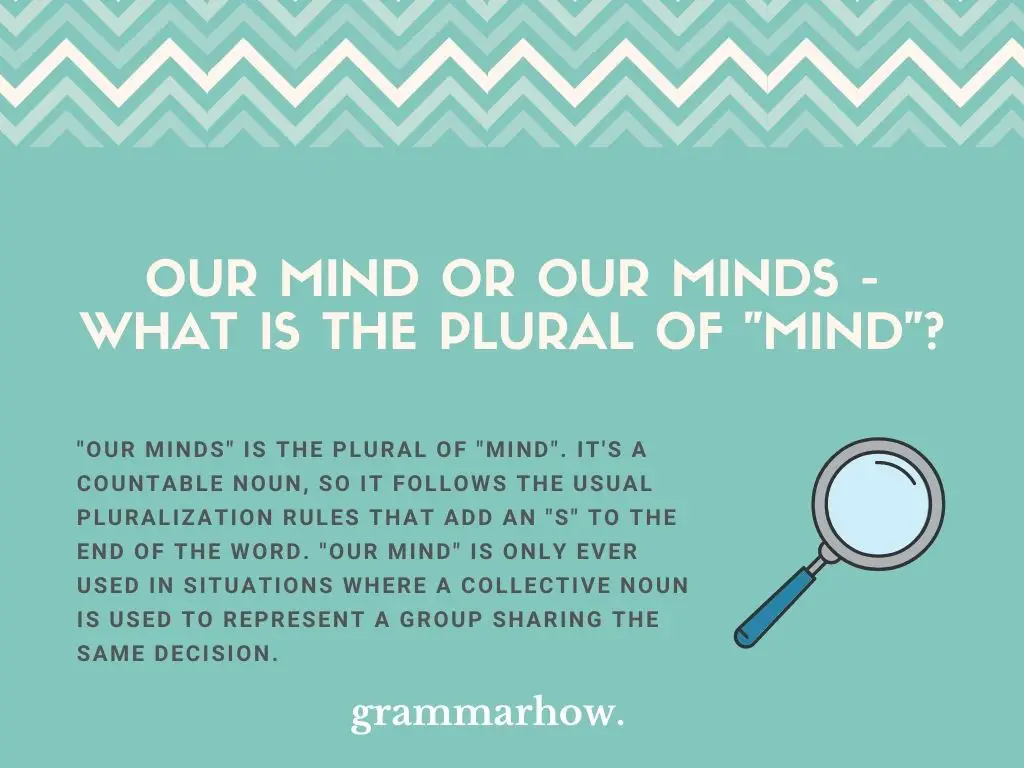Sometimes, you’ll come across nouns that have similar singular and plural forms. This article will explore how “our mind” and “our minds” work and which one of the two is the correct form.
Our Mind or Our Minds – What Is The Plural of “Mind”?
“Our minds” is the plural of “mind”. It’s a countable noun, so it follows the usual pluralization rules that add an “s” to the end of the word. “Our mind” is only ever used in situations where a collective noun is used to represent a group sharing the same decision.

To help you understand the difference, you can refer to these two examples:
- We have made up our minds, and we’re not changing them.
- Our mind is made up, and we find the defendant guilty.
The first example demonstrates that multiple people have come to a decision. Since multiple decisions and thought processes were involved, it makes sense to use “minds” as the plural.
The second example references a courtroom, specifically the jury within a case. It is used to group all of the people in the jury as a single entity. Since they all come to one decision, it makes sense to use “our mind” here.
Our Mind
“Our mind” is very uncommon, but it is correct. It will only appear when you are using a collective noun that refers to multiple people, but those people all come up with the same decision. This decision should impact the overall outcome of something in the same way.
The most common places to see “our mind” used is in things like:
- Juries
- Judges panels
- Board meetings
- Families
- Group hearings
Basically, any time when a group of people has to come to the same decision about something is where “our mind” might make sense.
- We have made up our mind now, and we are ready to pass on our verdict.
- Our mind has been made up, and there isn’t going to be much you can do to change that.
- You will not change our collective mind. We have already decided on the outcome, and that’s final.
- The jury would like to speak our mind, if that’s quite alright with you, sir?
- The judges have come to a decision. Our mind will not be changed at this time, and we will continue on.
Our Minds
“Our minds” is the most common way of writing the plural for “mind.” It works best when you are referring to a group of people that our coming to unique decisions (even if those decisions have some kind of overlap).
Even in situations where collective nouns are used, you’ll probably still be better off with “our minds.” It’s the more natural choice that tends to follow formal rules regardless of the situation, so it’s the one that’ll work best in most cases.
- Our minds will not be changed. There’s very little else that needs to be said about this matter.
- We want you to change our minds, but you don’t seem to be able to come up with anything useful.
- Our minds are unique to us. There is no way we could be thinking the same thing.
- You want to pry into our minds, don’t you?
- This is it. Our minds are made up. We will discuss this no further.
Is It “Their Mind” or “Their Minds”?
“Their minds” is the best way to write this phrase as “minds” is a plural that allows you to refer to multiple “minds.” However, “their mind” can work if you are referring to a collective group of people that might all be coming to the same decision about something.
If you want to know how to use “their minds,” it looks like this:
- Their minds have been made up already.
- Are they out of their minds? That was a ridiculous thing to say!
Here’s how “their mind” might work, though it’s much less common:
- The judges have spoken, and you will not change their mind.
- The jury is out of their mind.
Final Thoughts
You can use “our minds” in nearly every situation, so it’s the one that makes the most sense to learn. “Our mind” does work as a plural form, but you should only use it when referring to collective nouns that might be treated as singular entities.

Martin holds a Master’s degree in Finance and International Business. He has six years of experience in professional communication with clients, executives, and colleagues. Furthermore, he has teaching experience from Aarhus University. Martin has been featured as an expert in communication and teaching on Forbes and Shopify. Read more about Martin here.

